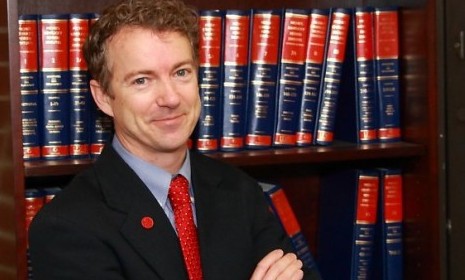On the campaign trail with Rand Paul
According to a new GQ feature, the opthamologist-turned-politican has a weakness for high-brow poetry and Hitler analogies

A free daily email with the biggest news stories of the day – and the best features from TheWeek.com
You are now subscribed
Your newsletter sign-up was successful
At this strange moment in American politics, Tea Party hero Rand Paul may "soon be the most radical member of the U.S. Senate," says GQ's Jason Zengerle in his new 5,000-word profile of the GOP upstart, a Senate candidate in Kentucky. Here are five key insights from this "long-awaited" article:
1. Paul has a complicated relationship with the GOP
As an anti-establishment candidate embraced (and funded) by the Tea Party, Paul made his primary campaign in large part a referendum on Senate Minority Leader Mitch McConnell (R-KY), using his "nothing-to-lose freedom to attack the most powerful figure in Kentucky — and in some respects national Republican — politics." Then he won. His biggest challenge now, Zengerle says, is "figuring out how to cozy up to the GOP establishment without alienating" his base of "rabidly" anti-establishment Tea Partiers.
The Week
Escape your echo chamber. Get the facts behind the news, plus analysis from multiple perspectives.

Sign up for The Week's Free Newsletters
From our morning news briefing to a weekly Good News Newsletter, get the best of The Week delivered directly to your inbox.
From our morning news briefing to a weekly Good News Newsletter, get the best of The Week delivered directly to your inbox.
2. Rand Paul isn't Ron Paul
Much of his GOP fence-mending involves working to "reassure Republicans that he's not the fringe figure they fear: "That he isn't, in effect, his father," libertarian icon Rep. Ron Paul (R-TX). That means distancing himself from his father's strong opposition — which "in the past Rand has faithfully echoed" — to the GOP's "military adventurism" and other hard-line foreign policy positions. So Rand met secretly with "the Ron Paul Revolutionaries' biggest bogeymen": Israeli lobbying arm AIPAC and "neocon" journalists like William Kristol and Dan Senor. The "bogeymen" came away largely reassured, Zengerle reports.
3. The campaign has gone into lockdown mode
The "freewheeling," media-friendly style that Paul cultivated during the primaries died after he created a media firestorm by airing his opposition to the Civil Rights Act on MSNBC. Now he "confines his national media appearances to Fox News and conservative talk radio," and doesn't even release his schedule to local newspapers and TV stations.
A free daily email with the biggest news stories of the day – and the best features from TheWeek.com
4. Paul dabbles in dicey Hitler comparisons
Paul rails against what he calls the media's unfair depiction of the Tea Party — "I don't ever call somebody a Muslim or do any of that kind of stuff," Paul says — but during an informal exchange with a pack of reporters (including GQ's Zengerle), Paul introduces a "repugnant" analogy that veers rather close to comparing President Obama to Adolf Hitler. In the end, Paul dials it back into a debate-worthy statement on the dangers of excess government debt and loose monetary policy — but, says Zenglerly, what many of his supporters hear is that "he's calling Obama Hitler."
5. He is trying to rein in his inner smartypants
"Unlike some of the prominent Tea Party leaders he's routinely lumped in with," Zengerle says, "Paul is not an idiot." And while he holds radical libertarian ideas, he appears to have "more affection for the dead poets he quotes in his speeches" — T.S. Eliot, Emily Dickenson — "than for the audiences" he riles up with his anti-government stemwinders. Other Tea Party icons similarly refuse to talk to the "mainstream media" — but Paul "doesn't avoid the press because, like [Nevada's] Sharron Angle, he's afraid of revealing his ignorance; rather, he does so because he's afraid he'll be unable to resist the temptation to prove how smart he is."